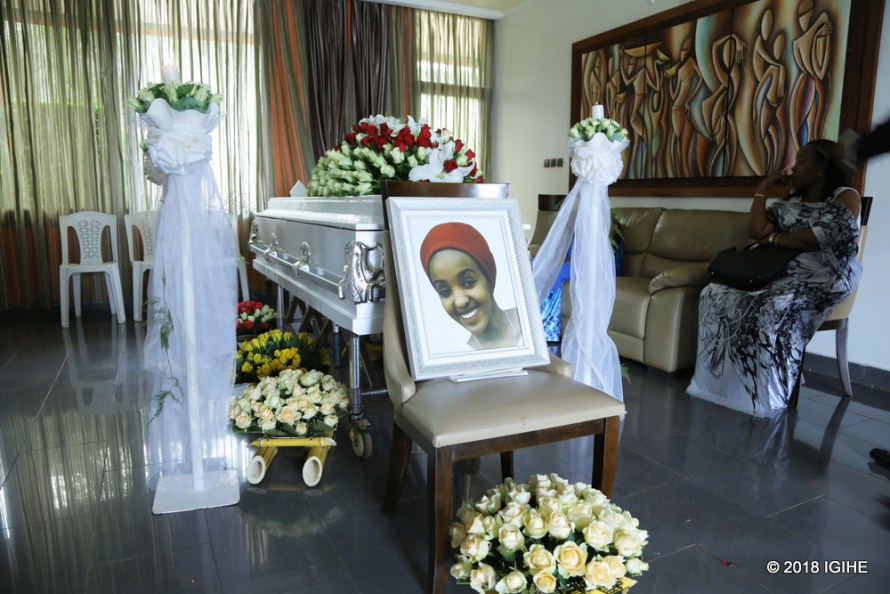
A guest post by Mireille Ishimwe, crossposted from Justice4 Survivors, reflecting on the tragic passing of Isimbi Fabienne, the cause of her death, and what it means to other survivors.
The song Mbahoze nte by Uwera Florida was playing in my earphones today since I learned about the tragic passing of Fabienne Isimbi, a genocide survivor of almost my age. Ayiiii mbahoze nte? Ayiiii mbagire nte…Humura Jambo aramubona… ”How can I wipe your tears”? What can I do to ”alleviate your pain”? ”Take heart God has an eye on you”. And the song goes on.
I never got a chance to know her in this life. I only read a few sentences written in honor of her memory by her family and the people who loved her dearly.
My heart broke as I read about the cause of her passing. She succumbed to severe convulsions related to injuries she sustained from the genocide-era.
I can’t stop thinking about her and the pain survivors live with, on a daily basis. She was one-year-old during the 1994 genocide against the Tutsi. She lost her parents, she fought, endured, lived, loved, and was loved in return. Looking at her picture this morning, I saw her bright smile and her beauty. I can only imagine the void she leaves in the hearts of those who cherished her.
Survivors’ pain in Silence
In the middle of my emotional breakdown, I prayed that we don’t see more Isimbis in the future, but alas I am not sure of that. My heart bleeds for my fellow survivors. Life is difficult in general, but it is more burdensome for you, the survivors.
You carry it alone, you suffer in silence, you die a slow and painful death.
I see the scars in our men’s face, they mask it, they try hard to crack the funniest jokes, but the painful marks of genocide do not completely vanish from their faces.
I went on with my venting, and I said: God, isn’t it hard enough that we suffered the genocide, should we suffer depression too, poverty, diseases, loneliness, losing children, betrayal?
Many of us, survivors, see ourselves in Isimbi. The question is not whether what happened to Isimbi can also happen to us. The question is perhaps when and who is next.
As the years go by, we realize the magnitude of what was inflicted on our bodies and our souls during the genocide. We recognize the life-long assault against our sense of humanity. What can we do? I am not here to offer solutions. I don’t have any yet, nor am I here to look for pity.
Wondering between the world of the dead and that of living
I am here to just think out loud and to possibly ring the bell about the invisible wounds of every genocide survivor. The wounds of those who feel pain but who can’t put the finger on where their pain is coming from. The pain of those who remember the horrors of the 1994 genocide as if it only happened yesterday.
Borrowing from the words of the author, Antoine Mugesera, “Every survivor has a vivid memory that easily wanders between the world of the dead and that of the living, their past is immersed under an ocean of wounds that will never close”. We are the survivors of Genocide. It is deeply ingrained in our identity.
There is no doubt that the passing of Isimbi made our minds wonder once again in the world of the dead, thinking about Isimbi’s life and the meaning of ours. May her beautiful soul rest with God and may he comfort her loved ones.
A wake-up call to care for each other
As I was between those two worlds, the saying: “umugabo arigira, yakwibura agapfa,” came to my mind. The saying translates to: “a man should be self -reliant, and if he loses himself he dies.” There is some truth in the fact that we as human beings should have faith in our abilities, but I disagree with the last part that suggests death when we err. We need each other more than we can possibly realize. We need a safe space. I know that sounds like a very western term to use but for lack of a better term, I will use safe space.
Therefore, fellow survivors, allow me to speak to you, let not my inexperience hinder you from hearing my voice. Let us pay attention to one another, let us go beyond our culture of secrecy, pride and self-reliance.
We need a safe space where we come as survivors of all ages, of all backgrounds, space where our stories are not deemed as “too much,” “too uncomfortable for some” “never-ending for others.”
We owe it to ourselves and to those we lost to:
“To lift each other’s spirit.
To be genuine and to listen with the intent to understand and to help if we can.
To show our soreness to one another without fearing judgment (tutaninurana/tudacishanyamo ijisho) and mockery.”
We alone know the courage it takes to wake up every morning, to develop the empires we built, to love our young families, and to impart wisdom in our children without the help of our mothers, fathers, uncles, and aunties. The most resilient people, I have had the honor of knowing are you, my people.
Let us collectively do something, anything before it is too late. May the Soul Fabienne Isimbi Rest in Peace. End
Written By Mireille Ishimwe
